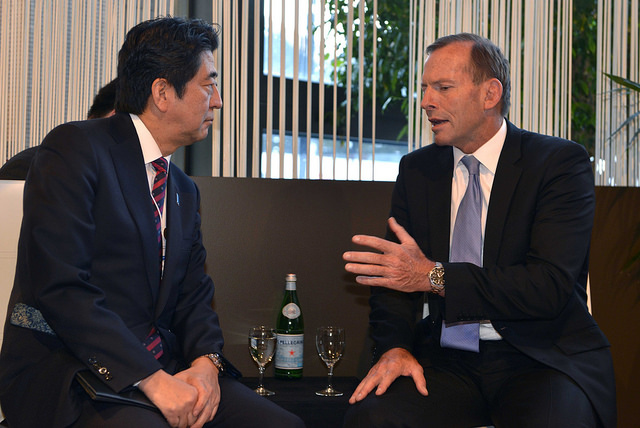
As regular folks in Canberra were closing down for the summer break, Graeme Dobell was on a writing roll for
The Strategist. He questioned the still freshly minted Prime Minister’s attachment to values in Australia’s foreign policy in four parts. By ‘joining values and interests’, said Dobell in the
first of these pieces:
Abbott is breaking the rule repeatedly preached by the political master who made him, John Howard. The Howard mantra was always about the need to focus on the interests that united China and Australia, keeping these completely separate from their differing values.
And Mr Abbott wasn’t just guilty of linking values and interests. He was also connecting them to the valuable cargo of Australia’s alliance policies. By turning Japan into an Australian ally
as well, Abbott had stretched the claim about common values beyond its normal Anglosphere confines. He’d also managed to antagonise China with whom Australia actually had quite a few shared interests to cultivate.
In his
final segment, Dobell says that he doesn’t want to suggest that values are unimportant. It’s just that Australian leaders need to avoid emphasising values that divide the region. Even so, he’s clearly still recommending that the interests side of the house should take the lead.
For many strategic analysts, material interests are more reliable and concrete than the values that encourage misty-eyed sentimentalism about traditional friends (like the United States) and obscure the importance of new partners (like China). But in a debate with Hugh White (whose position isn’t unlike the Dobell approach), I’ve
suggested that any bargain between the major powers will require at least some basic understanding about values. And I also think that what divides China and Japan in their hazardous and growing enmity isn’t so much a conflict of interests, but a competition for honour. This seems to me to be closer to the higher purposes of values than the sometimes transient advantage of interests.
Some don’t like the distinction I’ve made here: values can also be means to an end (including other values) and it’s sometimes very difficult to know where an interest begins and a value ends. But I actually think we should be welcoming a foreign policy debate where values are prominent. My one proviso is that leaders need to be absolutely honest when they make these claims. If Australia values human life and dignity, then it probably needs to fashion a different reputation for itself on the treatment of asylum seekers. A commitment to the freedom of speech abroad will also affect the way that media coverage is treated at home. And if Australia values democracy, it needs to acknowledge the differences in interpretation which occur not just with new democratic partners such as Japan and Korea but with old ones such as the US.
Finally, it’s just possible that a commitment to the value of progress will mean that illiberal China looms as a significant partner for Australia (and the US) beyond the context of interests.
Yan Xuetong’s remarkable attempt to apply the ancient writings of the sages to China’s contemporary foreign policy indicates that there’s a challenging but productive discussion to be had with some Chinese interlocutors on what values-based foreign policies might look like. I have a sneaking suspicion that when it comes down to it, almost everyone is more interested in values than might first seem the case.
Robert Ayson is professor of Strategic Studies at Victoria University of Wellington. Image courtesy of Flickr user Tony Abbott. Print This Post
Print This Post